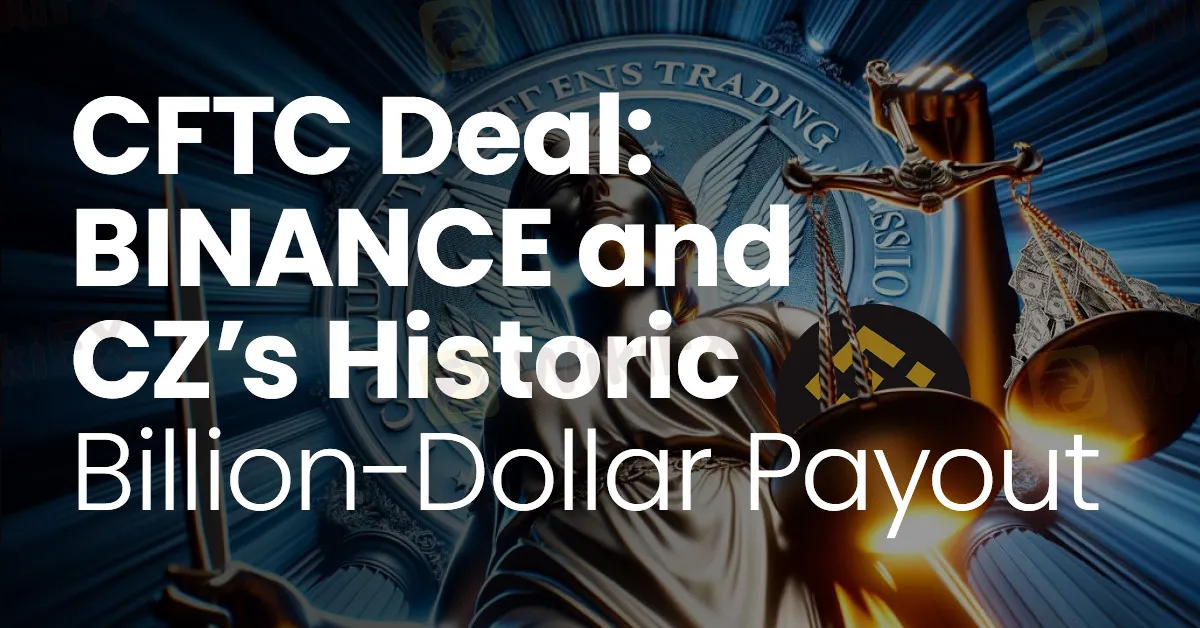简体中文
繁體中文
English
Pусский
日本語
ภาษาไทย
Tiếng Việt
Bahasa Indonesia
Español
हिन्दी
Filippiiniläinen
Français
Deutsch
Português
Türkçe
한국어
العربية
CFTC Deal: BINANCE and CZ’s Historic Billion-Dollar Payout
Abstract:The recent U.S. District Court approval of a substantial settlement between Binance, its former CEO Changpeng Zhao (CZ), and the Commodity Futures Trading Commission (CFTC) marks the resolution of a prolonged legal battle laden with significant financial penalties and regulatory implications.

The approval of a settlement by the U.S. District Court for the Northern District of Illinois commands significant fines from Binance and its former CEO, Changpeng Zhao, known as CZ, to be paid to the Commodity Futures Trading Commission (CFTC).
This decision mandates Binance to surrender $1.35 billion acquired from transaction fees and pay an additional $1.35 billion as a civil penalty to the CFTC. CZ, personally affected, faces a $150 million civil monetary penalty.
Initiated on March 27 by the CFTC against Zhao and Binance, the case accused the executive and the exchange of evading federal law and running an illegal derivatives exchange. The settlement, initially reached in late November, recently gained final approval from the court.
The CFTC confirmed on December 18 the court's endorsement of the settlement, signifying the conclusion of this long-standing legal battle.

Previously, Binance attempted to dismiss the lawsuit, contending that the CFTC exceeded its jurisdictional boundaries by attempting to regulate foreign entities outside the United States, critiquing the regulator's expansion efforts beyond the U.S. Commodity Exchange Act confines.
The cryptocurrency exchange highlighted the CFTC's broader arguments and redefined interpretation of the term “U.S. person,” indicating the regulator's pursuit of global control over derivatives products in the crypto domain.
Earlier this month, a U.S. district judge accepted CZ's guilty plea for anti-money laundering violations, the outcome of extensive federal probes. As part of the settlement, Binance, the co-founded cryptocurrency exchange, agreed to a $4.3 billion payment, constituting one of the largest corporate settlements. CZ also consented to a $50 million fine and stepped down as CEO of Binance.
Subject to federal guidelines allowing an 18-month maximum prison term, Zhao agreed not to contest any sentence within that duration. However, the decision on CZ's departure from the United States before his February 23, 2024, sentencing remains pending. He presently resides in the United Arab Emirates (UAE), with federal prosecutors opposing his departure. They cite Zhao's considerable wealth and the absence of an extradition treaty between the UAE and the U.S. CZ has been released on a $175 million bond.
Zhao's defense rebuts the flight risk assertion, referencing Judge Brian Tsuchida's previous ruling and arguing insufficient grounds for an appeal to reverse it. They stress CZ's global public figure status, his clean record, and the non-violent nature of his offenses as reasons against the necessity of his presence in the U.S. before sentencing.

Disclaimer:
The views in this article only represent the author's personal views, and do not constitute investment advice on this platform. This platform does not guarantee the accuracy, completeness and timeliness of the information in the article, and will not be liable for any loss caused by the use of or reliance on the information in the article.
Read more

Bybit Shuts Down NFT Marketplace Amid Crypto Market Downturn
Bybit announces the closure of its NFT marketplace, citing efforts to streamline offerings. Discover the latest trends in the declining NFT market and its shift to utility-based growth.

Galaxy Digital Settles $200M in Luna Token Manipulation Case
Galaxy Digital pays $200M to settle Luna token manipulation probe by NY regulators, linked to TerraUSD’s 2022 crash, impacting crypto market stability.

Vanuatu Passes VASP Act to Regulate Crypto and Digital Assets
Vanuatu's new VASP Act regulates crypto businesses, enforcing strict licensing, AML/CFT compliance, and investor protections.

Blockchain Decentralization: Empowering a Trustless Future
In recent years, blockchain technology has rapidly evolved from a niche innovation behind Bitcoin into a transformative force across industries. At its core, blockchain decentralization refers to the distribution of authority and decision-making away from a central entity and into the hands of a distributed network of participants. This shift redefines how data is stored and verified and paves the way for trustless, transparent, and resilient systems that challenge traditional centralized models.
WikiFX Broker
Latest News
The Withdrawal Trap: How Scam Brokers Lure Victims into Paying More
FCA to Investors: Think Twice Before Trusting These Brokers
Trump\s tariffs: How could they affect the UK and your money
Trump gambles it all on global tariffs he\s wanted for decades
TradingView Brings Live Market Charts to Telegram Users with New Mini App
Trump tariffs: How will India navigate a world on the brink of a trade war?
Interactive Brokers Launches Forecast Contracts in Canada for Market Predictions
Authorities Alert: MAS Impersonation Scam Hits Singapore
Stocks fall again as Trump tariff jitters continue
IG Group Acquires Freetrade for £160M to Expand UK Investment Market
Currency Calculator







